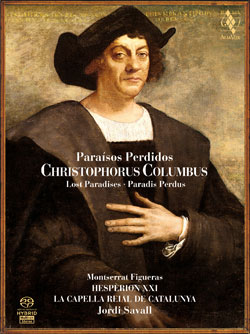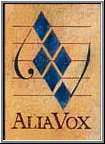|
Christophorus Columbus
Paradis Perdus / Lost
Paradises
Paraísos Perdidos |
|
Raices &
Memoria, vol. VI
Racines & Mémoire, Vol. VI, - Roots and Memory,vol. VI |
|
Alia Vox AVSA9850 (A+B)
Code-barres/Barcode:
7619986398501 |
|
|

Portrait posthume de Christophe Colomb
Portrait of a man said to be Christopher Columbus
Par/by: Sebastianio del Piombo (1485-1547)
|
Description
Artistes / Performers :
Montserat Figueras,
Hespèrion XXI,
La Capella Reial de Catalunya,
dir. Jordi Savall
Lieu d'enregistrement / Recording site: Monastèr
/ Monastery : Sant
Pere de Rodes (El Port de la Selva, Girona), Colegiata de Cardona
(1998-2005)
Dates d'enregistrement:
Juin, Juillet et Aout 2006
Recording dates: June,
July & August 2006
Durée totale / Total time:
CD 1: 78'14
CD 2: 70'40

|
|
|
|

|
|
|
 |
|
 C’est ... en récupérant et en revitalisant un
ancien patrimoine musical tout en approchant, depuis une
perspective différente, l’histoire et le passé, que nous pourrons
imaginer et mieux construire la mémoire du futur.
C’est ... en récupérant et en revitalisant un
ancien patrimoine musical tout en approchant, depuis une
perspective différente, l’histoire et le passé, que nous pourrons
imaginer et mieux construire la mémoire du futur.
JORDI SAVALL
Bellaterra, Eté 2006 |
 "... it is only by rediscovering and
revitalising the musical legacy of the past, at the same
time as we approach history and the past from a different
perspective, that we shall be better able to imagine and
build the memory of the future.
"... it is only by rediscovering and
revitalising the musical legacy of the past, at the same
time as we approach history and the past from a different
perspective, that we shall be better able to imagine and
build the memory of the future.
JORDI SAVALL
Bellaterra, summer 2006 |
|
Évaluations recensées / Reviews
located |
|

05/2007

#
553 (12/2007)
|

Kate Bolton |

Par: Matthias Lange
|
|

31:2
(11/12-2007) |

Opus
Haute Définition
(13/01/2007)
|
|

Par: Alexandre Pham |

Par: Jean-Charles Goldstuck |
|

Christophe Colomb
(1451-1506) |

Christopher Columbus
(1451-1506) |
|

Extrait du livret / From the liner notes |
|
 Christophe Colomb
Christophe Colomb
Paradis Perdus
Notre passé n’est pas seulement le nôtre. L’espace
géographique que notre culture a occupé durant des siècles
contenait en son sein des gens différents, pratiquant d’autres
formes culturelles et religieuses comme, au temps de l’ancienne
Hesperia, la musulmane et la juive. Mais au Moyen Âge – qui fut
comme l’époque actuelle, celle des haines religieuses et de
l’incompréhension – le paradis des « Trois cultures » de l’Hesperia
vint à se dégrader et pourtant malgré l’intolérance et les
cruautés, Arabes et Juifs habitaient parmi nous, vivaient comme
nous, étaient nous. À la fin du XVe siècle, après la conquête de
Grenade, ils furent expulsés ou convertis au Christianisme par
décret et leur départ signifia la fin d’une époque, la perte d’un
paradis possible : les textes la dénoncent, les musiques la
pleurent, la mémoire l’illumine et notre conscience la dignifie
Poursuivez votre lecture -
cliquez ici
+
Description
|
 Christopher Columbus
Christopher Columbus
Lost
Paradises
We are not the sole
owners of our past. The geographic space that our culture has
occupied over the centuries has contained within it diverse
peoples of different cultures and religions, such as the Muslim
and Jewish communities in ancient Hesperia. But the Middle Ages,
which, like the present day, was an age scarred by religious
hatred and incomprehension, saw the decline of the former paradise
of Hesperia and its “Three Cultures” where, despite all the
intolerance and cruelty, Arabs and Jews lived among us, lived like
us, were us. At the close of the 15th century, after the Christian
conquest of Granada, they were expelled or forcibly converted to
Christianity in compliance with royal decrees. Their departure
marked the end of an era, the loss of a possible paradise: events
which are decried in the written word, lamented in music,
illuminated by memory and dignified by our conscience.
Read on...
click here
+ Description
|
|
Gramophone-
(05/2007)
|
|
Subscription
Abonnement |
Reviewer:
Ivan Moody
Excerpts-:
"There's
a very wide range of music, from an evocation of Seneca, whose words
Columbus quoted, to the Quechua hymn
Haimpachap cussicuinin,
by way of Sufi-style improvisation, Andalusi and Sephardic music and
liberal doses of polyphony, sacred and secular. The musicians must
cover a huge array of styles, vocal and instrumental, but that is
par for the course for Hesperion XXI and the Capella Reial."
"So
while there is nothing precisely new in the performances or much of
the repertoire here, those willing to give themselves over to the
astonishingly vivid sound world captured on these
SACD
recordings will no doubt come away much enriched." |
| |
|
Diapason- # 553
(12/2007)
|
 |
Appréciation
5 Diapasons
Evaluation |
Abonnement
Subscription |
Analyste: Roger
Tellart
Extrait:
"Jordi et "Monsé" témoignent de cette destinée en
fins musiciens et en poètes avec un choix foisonnant (pas moins de
soixante pi`ces!) qui tourne à l'inventaire de tout un siècle et
prétend à l'universalité (celle du monde connu à l'époque de la
Découverte). Un patrimoine en fait fréquenté depuis toujours par nos
interprètes: romances et lamentations de la diaspora séfarade,
improvisations de la tradition arabo-andalouse, sans parler des
emprunts au fonds religieux et séculier des franco-flamands et de la
Tierra Madre, quitte à déborder sur le début du XVIe siècle et
à s'aventurer sur les terres métissées du territoire amérindien. On ne
se lassera pas de ces "Paradis Perdus", même s'ils résonnent à
nos oreilles avec un je ne sais quoi de déjà entendu, conséquence de
l'inaltérable beauté du son "Savall", qu'il soit d'hier ou
d'aujourd'hui". |
|

31:2 (11/12-2007) |
 |
Appréciation
~~~~~
Evaluation |
Abonnement
Subscription |
Reviewer: Barry
Brenesal
Excerpt :
"... the performances by Hespèrion XXI and
La Capella Reial de Catalunya cannot be faulted. Their members are
acknowledged experts in their respective fields, often heard in
previous concerts and CDs featuring Savall, and sometimes venturing
out alone. From personal taste, I would single out the stylish and
reflective performance of Dufay’s
Departez vous by lutenist
Xavier-Díaz-Latorre; Montserrat Figueras and Hespèrion XXI in the
anonymous Sephardic romance, El moro
de Antequera; and the entire Capella
Reial in Cornago’s monstrously triumphal setting of the hymn,
Patres nostril peccaverunt.
The readers are clear and dramatically expressive after a fashion
that smells more of life than greasepaint.
The
packaging deserves a comment of its own. The look of it is that of a
thick digest-sized book, which leads one to hopes of actually
getting a tome along with your pair of CDs. This is, of course, not
the case. There are three interesting essays by Manuel Forcano,
Carlos Fuentes, and Rui Viera Nery (as well as a lengthy statement
of purpose by Savall), but all of it is supplied along with full
texts in successive waves of Spanish, French, English, Catalan,
German, Italian, Arabic, and Hebrew translations. The lack of
original texts in a variety of languages alongside translations is
an annoyance.
Excellent sound is furnished, though sometimes with a cathedral-like
reverberance around a voice—again, a matter of promoting a specific
mood. I think this album would greatly please an early-music novice,
or a student of the period, or perhaps people who wished to learn
more of their own heritage. Others should look to the many other
Alia Vox releases by Savall for strictly musical pleasure of a very
high order."
|
|
| |
Autres références disponibles via la base de
données de Todd McComb/ Other available references via
Todd McComb's database:
(Site: http://www.medieval.org)
Re:
AVSA9850 |
|
|
|
|
To order / Commander
Alia Vox AVSA9850 (A+B)
Code-barres/Barcode:
619986398501
*
WILL SHIP ANYWHERE IN THE WORLD
 EXPÉDITION PARTOUT DANS LE MONDE
EXPÉDITION PARTOUT DANS LE MONDE
|
|
La viole de
gambe
Parutions
récentes |
Viola da gamba
Recent
releases |








